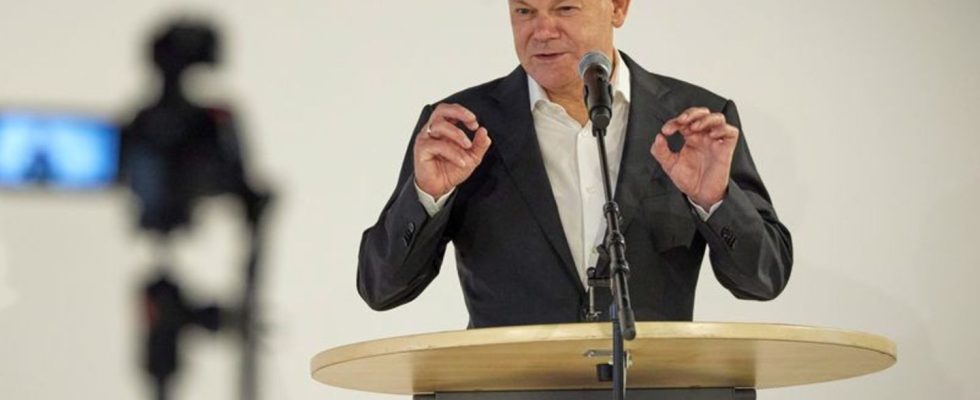refugees
Scholz wants consensus with countries and opposition on migration
Chancellor Olaf Scholz (SPD) is confident after the migration summit. photo
© Jörg Carstensen/dpa
There are no concrete results yet, but a start has been made. The traffic light government, the states and the opposition want to regulate the containment of the number of refugees by consensus. After a first meeting there is quite a bit of optimism.
After the migration summit in the Chancellery, Chancellor Olaf Scholz showed confidence that he would find common solutions with the federal states and the opposition to curb irregular immigration. “This should be an issue where we solve problems together and not all point fingers at each other,” said Scholz on Saturday at an SPD event in Teltow near Potsdam. “I believe our country deserves that and that’s what the citizens want too.”
The CDU leader and opposition leader in the Bundestag, Friedrich Merz, also expressed his willingness to hold further talks. “We agree on the goal: the high numbers of illegal immigration must come down quickly,” he told “Welt am Sonntag”. “However, cooperation will only be considered for us if the measures agreed as part of a Germany pact are substantial and effective. They must be suitable for achieving a far-reaching limitation or a halt to illegal migration to Germany.”
Good atmosphere, but no concrete results yet
On Friday evening, Scholz explored possibilities for agreement on the issue at a dinner in the Chancellery with Prime Ministers Boris Rhein (Hesse, CDU), Stephan Weil (Lower Saxony, SPD) and, for the first time, with Merz as opposition leader in the Bundestag. All sides then called the two-hour deliberations constructive – even if there were no concrete results. But that wasn’t planned from the start.
By the time all prime ministers meet with Scholz in Berlin on November 6th, concrete solutions should now be found on how to get the influx of hundreds of thousands of refugees to Germany under control.
Scholz welcomes the states’ decisions
Scholz demonstratively welcomed the decisions that the state prime ministers made on Friday before the top meeting in the Chancellery. They would fit in well with what the federal government has already initiated or planned. “That’s why I’m pretty confident that we’ll be able to persuade the federal and state governments and, if it works, the opposition parties to join in.”
In their decision on Friday, the federal states are demanding, among other things, effective measures to speed up asylum procedures, stationary border controls at the borders with the Czech Republic and Poland and a nationwide uniform payment card for asylum seekers instead of payments in cash. “The measures taken so far are not yet sufficient to limit irregular migration,” says their paper.
The Union also puts cards on the table
Federal Interior Minister Nancy Faeser (SPD) had already presented the basic principles of a bill on Wednesday that aims to reduce the number of deportations that fail at the last moment. In addition, the immigration authorities should be relieved by extended deadlines.
At the meeting in the Chancellery, the Union also presented a list of demands with 26 points. In it, Scholz demands, among other things, a “common understanding” that “Germany can tolerate asylum immigration of up to a maximum of 200,000 people per year with a view to the integration infrastructure and social cohesion.” Against this background, there must be a government statement from the Chancellor with the signal: “Germany’s absorption capacities have been exhausted.”
A lot also depends on the Greens in government, who have so far focused on aid for municipalities rather than limiting immigration. Baden-Württemberg’s Prime Minister Winfried Kretschmann called on his party to compromise. “If, in the name of humanity, we massively overtax society’s willingness to accept in the long term, then we will lose the acceptance of the citizens,” he warned at a state party conference in Weingarten. “The result of such a policy would not be more but less humanity.” The crisis has the power to shake the democratic community. “We must not allow that under any circumstances.”
The invitation came after the shift to the right in Hesse and Bavaria
Scholz had invited people to the top meeting after the state elections in Hesse and Bavaria. All traffic light parties suffered dramatic losses, while the AfD won significantly and even came second in Hesse. The shift to the right was largely attributed to dissatisfaction with migration policy. Between the beginning of January and the end of September, 233,744 people applied for asylum for the first time in Germany, around 73 percent more than in the same period last year.
Shortly before the elections, Scholz said for the first time that, in his opinion, too many refugees were coming to Germany. Even before that, he had offered the states and the “democratic opposition” a “Germany Pact” to advance reforms. By this he not only meant curbing irregular migration, but also other issues such as reducing bureaucracy.

